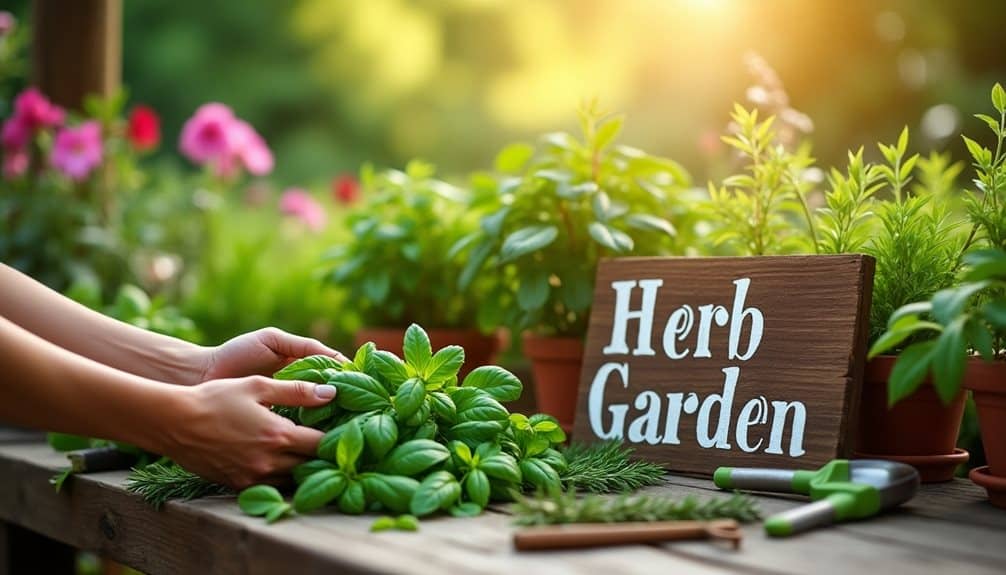Turning a love for gardening into a home business begins with identifying a niche, such as rare plants or sustainable practices. A solid business plan outlines products, target markets, and financial forecasts. Building a strong brand through social media and customer engagement helps establish a loyal community. Creating an organized workspace enhances productivity. Effective marketing strategies, along with networking, are vital for growth. With these steps in place, a gardener can thrive in a fulfilling venture. More insights await.
Identify Your Niche in Gardening

For aspiring entrepreneurs looking to transform their passion for gardening into a successful home-based business, pinpointing a well-defined niche is crucial. A niche allows you to focus your efforts on a specific segment of the gardening market, making it easier to attract and retain customers.
One popular niche is specializing in rare succulents or exotic herbs. Succulents, for example, have surged in popularity due to their low maintenance needs and unique appearance. Rare varieties like Lithops (living stones) or Haworthia attract collectors and enthusiasts willing to pay premium prices. Similarly, exotic culinary or medicinal herbs such as lemongrass, stevia, or ashwagandha appeal to health-conscious consumers and gourmet cooks, offering a blend of beauty and functionality.
Another profitable niche is sustainable gardening, which focuses on eco-friendly practices. This can include selling organic seeds, promoting composting kits, or providing native plants that require less water and support local biodiversity. Sustainable gardening appeals to environmentally aware customers who want to reduce their carbon footprint and create self-sustaining gardens.
Indoor gardening is also a booming niche, especially in urban areas where outdoor space is limited. Indoor plants like spider plants, pothos, and fiddle leaf figs not only enhance home aesthetics but are also known for their air-purifying qualities. Offering products such as stylish plant containers, grow lights, or hydroponic kits can attract city dwellers interested in creating green spaces inside their homes.
Understanding your target customers’ preferences is essential for success. For instance, millennials and Gen Z buyers tend to favor plants that are easy to care for and visually appealing for social media sharing. Older gardeners might prioritize medicinal or culinary uses of plants. Market research through surveys, social media groups, and gardening forums can provide valuable insights into what your potential customers want.
By honing in on a specific niche within gardening, you can develop unique products and services that differentiate your business from the competition. This focused approach not only increases your chances of building a loyal customer base but also allows you to align your business with your personal interests—making the journey both enjoyable and profitable.
Create a Business Plan
Developing a comprehensive business plan is crucial for any entrepreneur aiming to turn their passion for gardening into a thriving home-based business. This plan should clearly define the specific products or services offered, ensuring they are well-aligned with the chosen market niche, whether that be organic vegetable gardening, ornamental plants, garden design consulting, or specialized plant care.
A detailed financial forecast is essential. Entrepreneurs must estimate potential revenue, including projected sales volumes and pricing strategies, alongside anticipated expenses such as supplies, tools, marketing costs, and any labor. Calculating profit margins and identifying the break-even point will provide insight into the business’s financial health and sustainability.
Understanding the target audience is key to effective marketing. This involves researching demographics, preferences, and buying behaviors of potential customers—be they local homeowners, urban gardeners, or landscaping firms. Tailored marketing strategies might include community workshops, social media campaigns showcasing gardening tips, seasonal promotions, or collaborations with local nurseries.
Operational procedures must be clearly outlined for smooth day-to-day management. This includes sourcing high-quality seeds, plants, soil, and tools from reliable suppliers or wholesalers. It also covers order fulfillment processes, such as packaging, delivery logistics, or setting up local pick-up points. Additionally, incorporating sustainable practices like composting and using eco-friendly materials can appeal to environmentally conscious customers.
By meticulously crafting this roadmap, aspiring gardening entrepreneurs can confidently navigate the challenges of business ownership. This structured approach not only helps secure financial success but also nurtures the personal satisfaction that comes from cultivating a business rooted in passion for gardening.
Building Your Brand
Creating a strong brand identity is a vital step for any gardener aiming to launch a successful home-based business. A distinctive brand reflects the unique gardening style, philosophy, and values of the gardener, helping them stand out in an increasingly competitive marketplace. This identity should clearly communicate the gardener’s authenticity, passion, and expertise, which are key to attracting and retaining customers.
A well-defined brand goes beyond just a logo or business name; it encompasses the overall customer experience, including the tone of communication, visual style, and product quality. For gardeners, this might mean highlighting sustainable practices, organic growing methods, or specialty plants that differentiate their offerings.
Engagement through social media platforms like Instagram, Facebook, and Pinterest is essential for increasing brand visibility. These channels allow gardeners to share their journey, post high-quality images of plants and products, and offer valuable gardening tips that position them as trusted experts. Sharing success stories and customer testimonials also builds credibility and encourages potential buyers to connect.
Regularly updating social media with content such as plant care guides, seasonal planting advice, and behind-the-scenes glimpses into the gardening process fosters a sense of community and loyalty among followers. Utilizing features like live videos, stories, and interactive polls can further enhance customer interaction.
A cohesive brand message that resonates with customers’ values—such as eco-friendliness, creativity, or wellness—can transform casual buyers into lifelong supporters. This connection is crucial because strong customer relationships lead to repeat business and word-of-mouth referrals.
Ultimately, by focusing on their unique narrative and consistent messaging, gardeners can build a brand that represents not just their products but their personal freedom and passion for gardening. This approach allows their love for gardening to flourish into a profitable and fulfilling business venture.
Set Up Your Home Workspace for Gardening Success
Creating a dedicated workspace at home is crucial for gardeners who want to transform their passion into a thriving business. A well-organized and thoughtfully designed area not only boosts creativity but also enhances efficiency, making daily gardening tasks smoother and more enjoyable.
Choosing the Right Location
Begin by selecting a specific spot that inspires you and suits your gardening needs. This could be a sunny corner of a room, an unused part of your garage, or even an outdoor shed. Access to natural light is important as it helps improve mood and focus, while also benefiting any plants or seedlings you might be nurturing indoors.
Essential Tools and Supplies
Make sure all your gardening tools are within easy reach. Key items include pots, potting soil, seeds, fertilizers, pruning shears, and other gardening supplies. Keeping these organized helps prevent wasted time searching for materials, which is essential when managing a business.
Storage Solutions
Investing in practical storage options like shelving units, storage bins, and a sturdy potting table can help maintain order. Shelves allow you to store pots and containers vertically, maximizing space. Clear storage bins make it simple to categorize seeds and tools while protecting them from moisture and pests.
Lighting and Ventilation
Proper lighting is vital for both the gardener’s comfort and plant health. If natural light is limited, consider installing full-spectrum grow lights that mimic sunlight, promoting healthy plant growth. Good ventilation is equally important; it helps regulate temperature and humidity, reducing the risk of mold and diseases that can harm plants.
Creating an Inspirational Environment
Adding personal touches such as plant-themed artwork, a comfortable chair, or a small speaker for background music can make your workspace more inviting. A pleasant environment helps maintain motivation during long work sessions.
Benefits of an Optimized Workspace
By carefully organizing your home workspace, you not only improve productivity but also set a professional tone for your gardening business. An efficient workspace supports better plant care, promotes innovative ideas, and helps you manage orders and inventory effectively.
In summary, a well-planned home workspace combines functionality with inspiration. It acts as the foundation for growing your garden and your business simultaneously, encouraging both personal satisfaction and commercial success.
Marketing Your Gardening Products and Services

While many gardeners excel at cultivating plants, successfully marketing their products and services is equally important for transforming a gardening hobby into a profitable business. To achieve this, implementing effective customer engagement strategies is essential. Building strong relationships with potential buyers not only enhances customer loyalty but also encourages repeat purchases, which are the backbone of sustainable business growth.
One powerful way to engage customers is through hosting workshops, seminars, or community events. These opportunities allow gardeners to showcase their expertise and create personal connections with the local community. For example, offering classes on seasonal planting tips or organic pest control can position the gardener as a trusted expert, increasing customer confidence and trust in their products and services.
Utilizing seasonal marketing techniques is another critical strategy. Gardeners can capitalize on specific times of the year—such as spring planting season, summer garden care, or fall harvest preparation—to promote products that meet timely needs. For instance, marketing bulbs and seeds in early spring or holiday-themed plant arrangements in winter can boost sales by aligning offerings with customer demand.
In today’s digital age, developing a strong presence on social media platforms like Instagram, Facebook, and Pinterest is vital. These channels enable gardeners to share beautiful photos, gardening tips, customer testimonials, and special offers directly with a large audience. Additionally, creating regular newsletters keeps customers informed about new products, upcoming events, and exclusive discounts, fostering ongoing engagement.
Participating in local markets and fairs remains an effective method to attract attention and generate sales. Face-to-face interaction allows gardeners to explain product benefits, answer questions, and receive immediate feedback. Combining this traditional approach with a modern digital strategy creates a well-rounded marketing plan.
By blending creativity with strategic marketing efforts—such as targeted promotions, educational content, and personal customer interactions—gardeners can successfully transform their passion for plants into a thriving home-based business. This approach not only increases revenue but also offers the freedom to pursue gardening full-time while building a loyal customer base.
Develop an Online Presence
Establishing a strong online presence is crucial for gardeners who want to grow their home-based gardening business beyond just local customers. A professional, well-designed website acts as a digital storefront where visitors can explore your products and services anytime, anywhere. The website should be user-friendly, with easy navigation, fast loading times, and a clean, attractive design that reflects your brand. Integrating search engine optimization (SEO) techniques ensures your site ranks higher on search engines like Google, making it easier for potential customers to find you.
Beyond the website, social media platforms such as Instagram, Facebook, Pinterest, and TikTok offer opportunities to showcase your gardening projects, share tips, and engage with a vibrant community of garden lovers. Posting high-quality images and videos of your plants, garden layouts, or step-by-step guides can inspire followers and build trust in your expertise. These platforms also allow for direct communication with customers through comments and messages, which helps build relationships and encourages repeat business.
Using tools like email newsletters can keep your audience informed about new products, seasonal promotions, or gardening advice. Incorporating e-commerce capabilities on your website enables customers to purchase seeds, plants, or garden accessories directly from you, expanding your reach globally.
By strategically combining these digital tools—an optimized website, active social media presence, and email marketing—gardeners can effectively grow their brand, attract new clients, and enjoy the flexibility of running a successful online enterprise.
Network With Other Gardeners and Local Businesses
Building a network with fellow gardeners and local businesses can significantly boost the success of a home gardening venture. Getting involved in community gardening projects, such as local garden clubs or urban farming initiatives, allows you to meet passionate individuals who share your interests. These connections provide a platform to exchange knowledge, learn new techniques, and share resources like seeds or tools.
Joining or hosting gardening workshops and seminars can help sharpen your skills while creating opportunities to connect with experts and enthusiasts in your area. These events often lead to valuable collaborations.
Forming partnerships with nearby nurseries, farmers’ markets, garden centers, landscapers, or eco-friendly stores can create mutually beneficial arrangements. For example, cross-promoting each other’s products or services can bring more customers to all parties involved. Local businesses may also offer wholesale opportunities, discounts on supplies, or venues for selling your products.
Additionally, tapping into local business networks such as the Chamber of Commerce or small business associations can provide access to resources for marketing, financing, and legal advice.
By cultivating these relationships, gardeners not only gain support but also create a dynamic ecosystem of collaboration that fosters innovation and growth in their business.
Manage Finances and Legal Requirements
After building strong networks and establishing an online presence, managing the financial and legal aspects of a home gardening business is vital for long-term success and sustainability.
Creating a comprehensive budget is the foundation of sound financial management. This budget should include all expected expenses such as seeds, soil, tools, packaging, website maintenance, marketing costs, and any labor expenses. It should also forecast revenue based on realistic sales targets.
Understanding tax obligations is critical. Home gardeners running a business need to know which taxes apply: income tax on profits, sales tax on goods sold (if applicable), and possibly self-employment taxes. Consulting a tax professional or accountant helps ensure compliance and can identify deductions or credits that reduce tax liability.
Registering your gardening business with the appropriate local or state authorities legitimizes your operations and may be required to open business bank accounts or apply for loans. Depending on your location and offerings (e.g., selling edible plants), you may need specific permits or licenses, such as a nursery license or health department certifications.
Maintaining clear financial records with accounting software or professional help is essential for tracking profitability and simplifying tax filing.
Taking the time to properly manage these financial and legal components provides a stable foundation that allows gardeners to focus on growing their business with confidence and avoid costly penalties.















